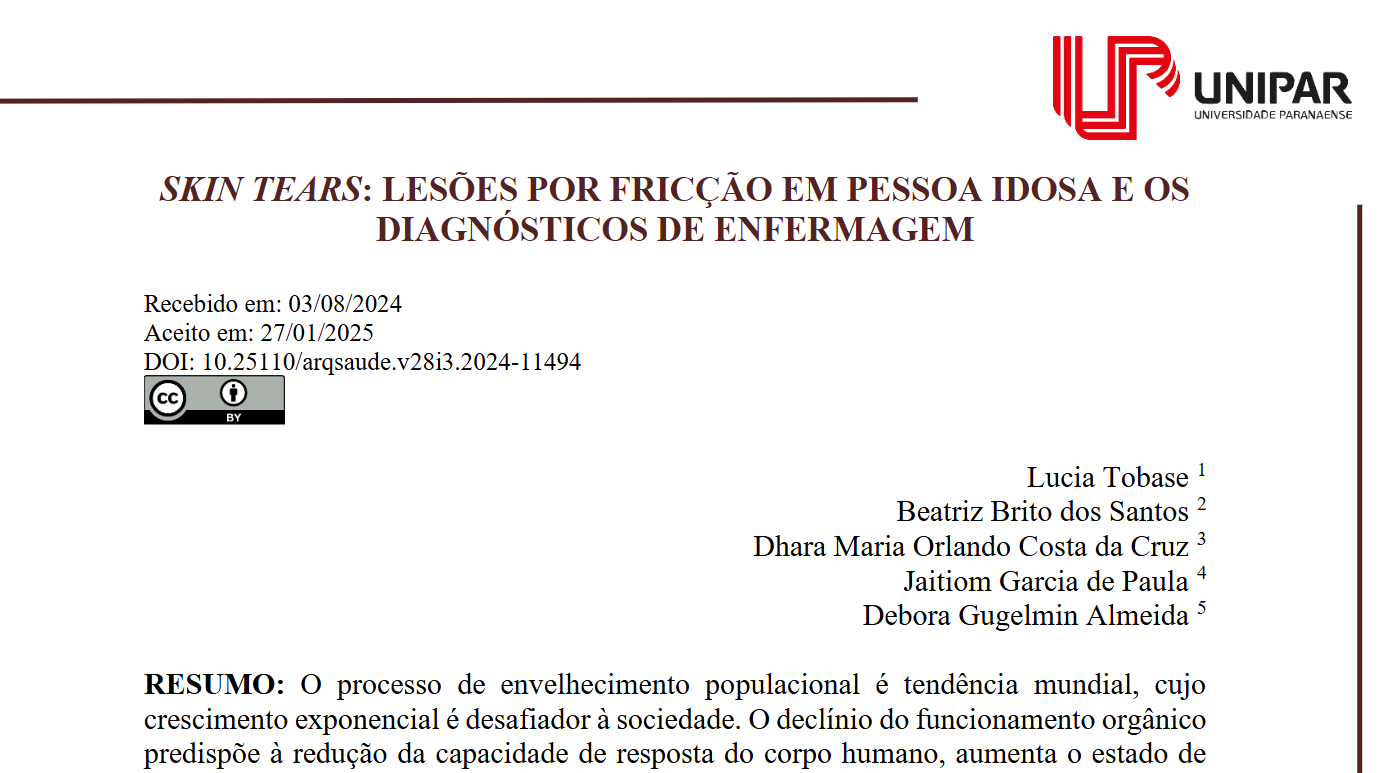 Congratulations to Dr. Debbie Almeida in the Faculty of Health & Social Sciences, who published her latest article late last month colleagues and students. This article SKIN TEARS: FRICTION INJURIES IN THE ELDERLY AND NURSING DIAGNOSES is in Portuguese and addresses the decline in organic functioning predisposes to a reduction in the human body’s response capacity, increasing the state of vulnerability and fragility of the elderly, especially in relation to the skin. This work aimed to organize nursing diagnoses to support nurses in proposing intervention and care for elderly people with friction injuries or skin tears. Exploratory study, carried out in two stages, with a literature review from December/2022 to March/2023, and structuring of nursing diagnoses. Eleven studies published in the last ten years on skin tears in elderly people were analyzed and 14 nursing diagnoses were structured. Preventive, care and therapeutic measures for skin tears were addressed, as aspects to structure nursing diagnoses for elderly people. Assertive diagnoses are fundamental for the correct planning and implementation of committed and safe assistance, influencing the quality of life of the person assisted
Congratulations to Dr. Debbie Almeida in the Faculty of Health & Social Sciences, who published her latest article late last month colleagues and students. This article SKIN TEARS: FRICTION INJURIES IN THE ELDERLY AND NURSING DIAGNOSES is in Portuguese and addresses the decline in organic functioning predisposes to a reduction in the human body’s response capacity, increasing the state of vulnerability and fragility of the elderly, especially in relation to the skin. This work aimed to organize nursing diagnoses to support nurses in proposing intervention and care for elderly people with friction injuries or skin tears. Exploratory study, carried out in two stages, with a literature review from December/2022 to March/2023, and structuring of nursing diagnoses. Eleven studies published in the last ten years on skin tears in elderly people were analyzed and 14 nursing diagnoses were structured. Preventive, care and therapeutic measures for skin tears were addressed, as aspects to structure nursing diagnoses for elderly people. Assertive diagnoses are fundamental for the correct planning and implementation of committed and safe assistance, influencing the quality of life of the person assisted
Well done!
Prof. Edwin van Teijlingen
Reference:
Tobse, L., Santos, dos Santos, B.B., Costa da Cruz, D.M.O., de Paulo, J.G., Almeida, D.G. (2025). SKIN TEARS: LESÕES POR FRICÇÃO EM PESSOA IDOSA E OS DIAGNÓSTICOS DE ENFERMAGEM. Arquivos de Ciências da Saúde da UNIPAR, 28(3):914–933, https://doi.org/10.25110/arqsaude.v28i3.2024-11494











 BU Leads AI-Driven Work Package in EU Horizon SUSHEAS Project
BU Leads AI-Driven Work Package in EU Horizon SUSHEAS Project Evidence Synthesis Centre open at Kathmandu University
Evidence Synthesis Centre open at Kathmandu University Expand Your Impact: Collaboration and Networking Workshops for Researchers
Expand Your Impact: Collaboration and Networking Workshops for Researchers Visiting Prof. Sujan Marahatta presenting at BU
Visiting Prof. Sujan Marahatta presenting at BU 3C Event: Research Culture, Community & Can you Guess Who? Thursday 26 March 1-2pm
3C Event: Research Culture, Community & Can you Guess Who? Thursday 26 March 1-2pm ECR Funding Open Call: Research Culture & Community Grant – Apply now
ECR Funding Open Call: Research Culture & Community Grant – Apply now ECR Funding Open Call: Research Culture & Community Grant – Application Deadline Friday 12 December
ECR Funding Open Call: Research Culture & Community Grant – Application Deadline Friday 12 December MSCA Postdoctoral Fellowships 2025 Call
MSCA Postdoctoral Fellowships 2025 Call ERC Advanced Grant 2025 Webinar
ERC Advanced Grant 2025 Webinar Update on UKRO services
Update on UKRO services European research project exploring use of ‘virtual twins’ to better manage metabolic associated fatty liver disease
European research project exploring use of ‘virtual twins’ to better manage metabolic associated fatty liver disease